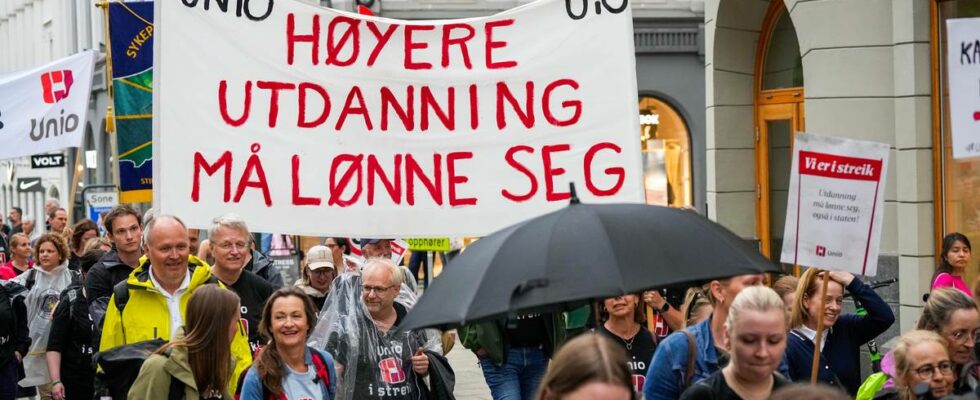The core of the tribunal’s decision is that the Akademikerne and Unio can keep their own collective agreement with the state. But only until 2026, according to what news knows. The agreement Akademikerne has had with the state since 2016 gives each individual workplace the opportunity to negotiate wages locally. Unio joined the agreement in 2022. In addition, the National Salary Board has decided that LO will be forced to transfer to YS’s collective agreement – something the LO members have said no to. But everything has an end date of 2026. The National Salary Board is sending the parties back to the negotiating table with the aim of them agreeing on an agreement from 2026, according to what news learns. Just as the state has wanted. The decision comes after the Akademikerne and Unio took several civil servants out on strike this spring. The strike caused, among other things, trouble in getting passports, as a result of several police officers being out on strike. Unio members also marched in the streets of Trondheim during the strike. Photo: Per Olav Alvestad / news The government gradually intervened and called off the strike with a forced wage board. One or more agreements The central point of contention between the employee organizations and the state has thus not been the contents of the revised main tariff agreements themselves, but what kind of agreement structure the employees in the state should be subject to. The academics and Unio believe that their agreement means that wages can be used actively as a tool to attract the expertise that is needed locally. In addition, they have believed that a joint agreement will result in poorer pay development for those with higher education. The academics believed in advance that it would be a direct attack on freedom of association and the right to negotiate if the organization was not supported by the National Salary Board. The academics and Unio represent, among other things, police officers, researchers, doctors, lawyers, dentists and architects. But the National Salary Board’s decision does not only cause jubilation in that camp, as far as news knows: they make the Akademikerne and Unio say that with a pot of 2.7 per cent that they can negotiate locally, and not 2.9 per cent, which was starting point. Strike for own agreement This decision from the National Salary Board has a long history. Earlier this year, the academics and Unio broke the mediation in the state settlement, because the offer from the state meant that they would in practice be excluded from the collective agreement the academics got while Erna Solberg (H) was prime minister, according to NTB. POLICE: The academics organize, among other things, police officers. Photo: NTB The government, as employer, wishes to return to the arrangement from before 2016, when there was a main tariff agreement for all organised. The reason is a desire for collective agreements that do not allow for more individual wage payments and increased wage differences. In the offer that LO and YS initially accepted, a significant part of the main clause in the agreement between the Academics and Unio is passed on – 75 per cent of the salary is to be distributed locally. LO members said no But even if LO Stat’s negotiating committee accepted the offer from the state, it was voted down in the preliminary vote before the summer. LO’s members do not want a collective agreement that is too similar to the one Unio and Akademikerne have today, and which LO members believe leaves too much of the salary funds for local distribution. LO believes that the result that there are now several different agreements with the state has contributed to “unequal wage development”, where the uneven distribution of the wage pot creates greater inequalities and undermined the frontline model. Voluntary wage board But instead of declaring a conflict and strike this summer, LO Stat chose to ask for a voluntary wage board. This spring, the Academics and Unio went on strike in the state. But the government chose to step in with a forced wage board after about a week and a half. The background to the strike was that the state demanded a return to a single collective agreement for state employees. Leader Kari Tønnessen Nordli in Akademikerne Stat was disappointed when Labor Minister Tonje Brenna intervened with a forced wage board. Photo: Beate Oma Dahle / NTB Since 2016, there have been two agreements – one for employees organized in YS and LO State, and another for Akademikerne and Unio members. LO Stat and YS also want to return to an agreement, while Akademikerne and Unio want to keep their agreement. The National Wages Board has been involved in the case, since the state used the forced wage board to end the strike in Akademikerne and Unio. In a process that may resemble a court case, the tribunal has now heard three different cases. One case between LO Stat and the state, a second case between Unio and the state and a third case between the Academics and the state. Published 19.11.2024, at 21.21 Updated 19.11.2024, at 21.31
ttn-69
The academics and Unio may retain their own collective agreement – news Norway – Overview of news from different parts of the country

